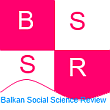Evaluating the Balkan Female Fieldwork Over Time: The Case of Albania
Abstract
Unique in its diversity, the Balkan region can be considered as an attractive destination for a variety of researchers. Presented in a form of a chronological analysis, this study focuses on the work of four female researchers who conducted fieldwork in Albania at the beginning of the 20th century, during communism, and shortly after communism during the transitional period, in order to capture the evolution of the female fieldwork in the Balkans over time. Since the fieldwork methodology stresses family, household and patriarchy, this study can contribute to the conceptualization of the political culture within the Balkan society.
Keywords: Albania, Balkans, ethnography, fieldwork, orientalism, balkanism.
Downloads
References
Ademi, N. et al (2013) The Impact of the Moral and Legal Foundations of the Albanian Society across Europe and Beyond, International Affairs and Global Strategy, 17, 44-47.
Allcock, J.B. & Young, A. (2000) Black Lambs & Grey Falcons: Women travelling in the Balkans, Berghahn Books, Bradford.
Bakic-Hayden, M. (1995) Nesting Orientalisms: The Case of Former Yugoslavia, Slavic Review, 54: 4, 917-931.
Calloni, M. (2002) Albanian Women after Socialism, in Athena (Advanced Thematic Network in Activities in Women’s Studies in Europe), The Making of European Women’s Studies, eds. R.Braidotti, I.Lazaroms, E.Vonk, Utrecht: Utrecht University, 49-60.
De Rapper, G. (2002) ‘Culture’ and the Reinvention of Myth in a Border Area, In: Schwander-Sievers, S. & Fischer, B.J. (ed) Albanian Identities Myth and History, Hurst & Company, London.
De Waal, C. (2005) Albania Today A Portrait of Post-Communist Turbulence, I.B. Tauris & Co Ltd, London.
Delamont, S. (2007) Ethnography and Participant Observation, (Ch. 13). In: Seale, C. et al (ed) Qualitative Research Practice. Thousand Oaks: Sage.
Durham, M.E. (1909) High Albania, Edward Arnold, London
Elsie, R. & Young, A. (ed) (2003) Behind the Stone Walls: Changing Household Organization among the Albanians of Kosovo, Dukagjini Balkan Books, Peja.
Fierstein, D. (2009) Kosovo’s Declaration of Independence: An Incident Analysis of Legality, Policy and Future Implications, Boston University International Law Journal, 26: 417, 417-442.
Godina, V. V. (2003) Anthropological Fieldwork at the Beginning of the 21st Century. Crisis and Location of Knowledge. Anthropos, 98:2, 473-487.
Grillo, R. D. (2003) Cultural Essentialism and Cultural Anxiety. Anthropological Theory, 3: 2, 157-173.
Hann, C. (1994), After Communism: reflections on East European Anthropology and the ‘transition’, Social Anthropology 2: 3, 229-249.
Horschelmann, K. & Stenning, A. (2010) 'Ethnographies of post-socialist change', Progress in Human Geography, 32: 3. 339-361
INSTAT (2006) Women and Children in Albania: Double dividend of gender equality, Social Research Centre, INSTAT.
Karakasidou, A. (1997), Women of the family, women of the nation: National enculturation among Slav-speakers in North- West Greece, in P. Mackridge, E. & Yannakakis (eds) Ourselves and Others. The development of a Greek Macedonia Cultural Identity since 2012. Oxford: Berg: 91-109.
Kaser, K. (2004) Perspectives for a historical-anthropological research of the Balkans, In: Jovic, M. et al (ed) Between the archives and the field: A dialogue on historical anthropology of the Balkans, Graz, Belgrade.
King, C. (2000) Queen of the Highlanders Edith Durham in “the land of the living past”, Times Literary Supplement, [online] available from: http://www.promacedonia.org/en/ed/e_durham.html [Accessed 2nd March 2015].
Kurti, L. (1996) Homecoming: Affairs of Anthropologists in and of Eastern Europe, Anthropology Today, 12: 3, 11-15.
Medawar, C. (1995) Mary Edith Durham and the Balkans 1900-1914, Master thesis, McGill University, Montreal.
Morris, M. W. et al (1999) Views from inside and outside: Integrating emic and etic insights about culture and justice judgements. Academy of Management. The Academy of Management Review, 24: 4, 781-796.
Mustafa, M. et al (2013) Spatial and Temporal Patterns in Kinship Relations: Descent, Marriage, and Feud (Ch. 5) In: Galaty, M et al. (2013) (ed) Light and Shadow: Isolation and Interaction in the Shala Valley of Northern Albania, Cotsen Institute of Archaeology Press at UCLA, Los Angeles.
Mustafa, M. & Young, A. (2008) Feud narratives: Contemporary deployments of Kanun in Shala Valley, northern Albania, Anthropological Notebooks, 14:2, 87-107.
Pandolfi, M. (2002) Myths and New Forms of Governance in Contemporary Albania, In: Schwander-Sievers, S. & Fischer, B.J. (ed) Albanian Identities Myth and History, Hurst & Company, London.
Sarcevic, P. (2004) “Tobelija”: a female-to-male cross gender role in the 19th and 20th century Balkans, in Jovanovic, M. et al (ed.) (2004) “Between the archives and the field: A dialogue on historical anthropology of the Balkans”, Belgrade-Graz.
Todorova, M. (1994) The Balkans: From Discovery to Invention, Slavic Review, 53: 2, 453-482.
Weeden, (2010) Reflections on Ethnographic Work in Political Science, Annual Review of Political Science 13, 255 -272.
Young, A. (2000) Women Who Became Men, Berg, Oxford.
Young, A. & Twigg, L. (2009) ‘Sworn Virgins’ as enhancers of Albanian patriarchal society in constrast to emerging roles for Albanian women, Etnoloska Tribina 32: 39, 117-134.
Permissions
Authors are expected to obtain permission from copyright holders for reproducing any illustrations, tables, figures or lengthy quotations previously published elsewhere. BSSR will not be held accountable for any copyright infringement caused by the authors.
Copyright
The content offered in the BSSR remains the intellectual property of the authors and their publishers respectively. University “Goce Delcev”- Shtip, R. Macedonia and BSSR keap the right to promote and re-publish the texts.



